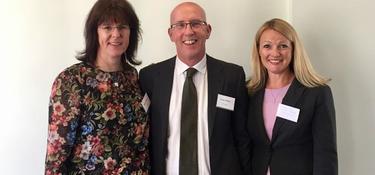Recently, I was fortunate enough to be invited to speak about gender diversity and inclusivity in the property industry at the very first ‘Women in Industrial Property’ conference. The event was organised by the Industrial Agents Society and was held at the headquarters of BAFTA in London.
Hosting the event in a venue linked to an industry forced to examine its own approach to inclusion and diversity over recent years, really highlighted the importance of creating a property industry accessible to all and I was heartened to see 200 women (and men), who work in the industrial property sector at all levels across the UK, gathered together to talk about a subject that is so important for the future of our industry.
The topics discussed during the event were extremely insightful and during my own panel discussion – which was devoted to exploring how we can encourage more women to join the industrial sector – we explored a number of issues, including the changing face of industrial property as a career choice.
From the reaction of a recent female graduate, now working in the industrial sector, it would seem that the industry is finally shedding the image of ‘grubby sheds’ and this is due, in no small part, to the role that ecommerce has played in completely reshaping the logistics sector. Industrial logistics it now seems, is as glamorous as retail and offices to a new graduate and that makes me feel very positive about the future.
However, although the number of women in the industrial property sector is growing, we are still an industry largely dominated by men and there are enormous opportunities here to not only attract women to consider and apply for jobs, but also to retain those women throughout their career by offering more flexible ways of working, providing good role models and remembering to include people from all genders and backgrounds on our marketing materials.
I’ve already mentioned that I was pleased to see the event was well attended by both men and women and I think it’s important we remember that, whatever our gender, culture, physical ability or sexuality, building a diverse and vibrant organisation is a shared responsibility and that the drive for change must come from the top. That’s why I am particularly proud of our inclusion and diversity programme at Prologis.
One of the key points which came out of the conference is that diversity is a leadership responsibility and I know that all our leaders at Prologis are committed to attracting talent from all backgrounds and walks of life. It’s not just the right thing to do, it also makes great business sense.
By actively developing and implementing strategies to recruit and retain more women, we help our businesses become more competitive and sustainable in the long term; however, it’s important that building a diverse and inclusive workplace becomes more than just words on a piece of paper. We need to bring those words to life.
If I could share only one thing from the conference it would be the opening words of the keynote speaker, Nicky Moffat CBE. The highest-ranking woman in the British Army from 2009 until her resignation in 2012, Nicky had one message for the industrial property sector:
‘Enough talk, commit to action’
She is right, of course. So many companies have inclusion and diversity policies that sit on a metaphorical shelf, gathering dust. To be truly effective, these policies have to be more than just a box-ticking exercise or a corporate cliché. Only by making diversity part of the culture of our businesses can we stop talking about change and start making change.

